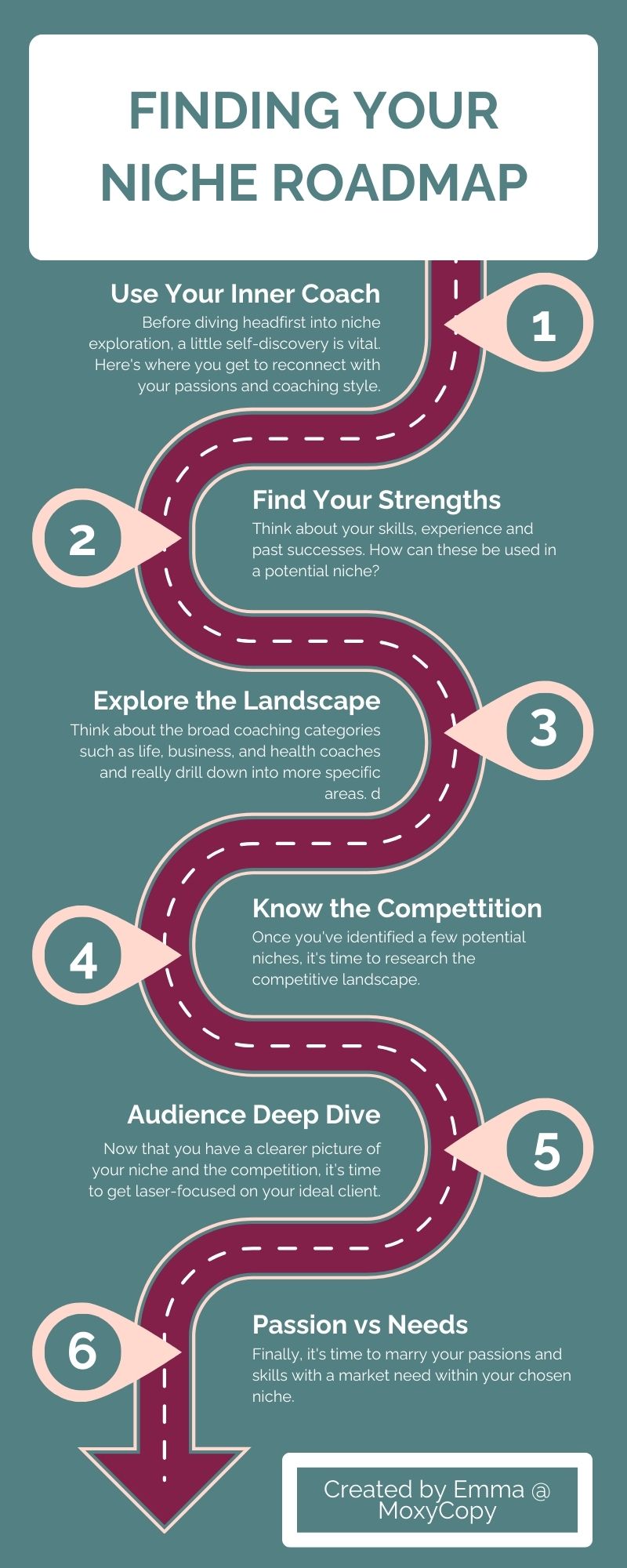Before we dive into the essential topic of finding your niche, this blog post contains affiliate links (they are identified by a *). This means I may earn a small commission to fund my coffee-drinking habit if you use these links to make a purchase. You will not be charged extra, and you’ll keep me supplied with caffeine. It’s a win for everyone, really.
Imagine ditching the broad label of “life coach” and instead becoming the ultimate champion for burnt-out entrepreneurs seeking to reclaim their work-life balance. Suddenly, your message transforms. It becomes a laser beam, directly addressing the unique needs, challenges, and aspirations of a very specific audience. This is the magic of niching down in the coaching market.
A niche isn’t just a fancy term. It’s essentially a targeted community within the vast coaching landscape. It’s a group of individuals united by a shared desire for change, facing distinct challenges and harbouring specific goals. By specialising in a niche, you don’t just become a coach; you transform into the go-to expert, the trusted guide who truly understands their world. Therefore, this strategic move doesn’t just attract your ideal clients; it paves the way for a thriving coaching business built on genuine connections and impactful results.
Think about it: When someone has a nagging toothache, they don’t seek out a general “medical professional.” They seek a dentist – a specialist with the targeted expertise to address their specific concern. And because they’re a specialist, they can charge considerably more. By niching down, you become the “dentist” in your chosen coaching niche, attracting clients who know you’re the perfect fit to help them achieve the transformation they deeply desire. However, it’s entirely understandable for you to be nervous about niching down. Finally, I know it can seem counterintuitive to narrow the pool of people you work with. So, before we dive into how to niche down, we’ll look at some pros and cons.
Pros and Cons of Niching Down
Let’s explore the two sides of the coin. While niching down offers a treasure trove of benefits, it’s important to acknowledge a few potential drawbacks…
| Pros | Cons |
|---|---|
| Become an Authority | Limiting Your Audience |
| By focusing on a specific niche, you gain a deeper understanding of the challenges and opportunities your ideal clients face. This allows you to develop specialised knowledge and expertise, positioning yourself as a trusted advisor in that particular area. Clients are more likely to choose a coach who is seen as an expert in their specific needs. | At first glance, niching down might seem like you’re limiting your potential client pool. However, remember you’re not excluding anyone, you’re simply choosing to serve a specific audience exceptionally well. A broader message might reach more people, but it’s less likely to resonate deeply with any of them. |
| Attract Ideal Clients | Missing Out on Opportunities |
| When you niche down, you can tailor your marketing message to speak directly to the desires, pain points, and aspirations of your ideal client. This targeted approach attracts individuals who are a perfect fit for your coaching style and offerings, leading to a higher quality of leads. | Niching down doesn’t mean you’re stuck forever. Once you’ve established yourself as an authority in your chosen niche, you can always consider expanding your offerings to a related area. But for now, focus on building a strong foundation within your niche. |
| Higher Conversion Rates | |
| With a targeted message and a deep understanding of your audience’s needs, you can create marketing materials and consultations that resonate on a deeper level. This leads to more qualified leads who are genuinely interested in your services, ultimately resulting in higher conversion rates (turning leads into paying clients). | |
| Stand Out From The Crowd | |
| The coaching market is saturated. By niching down, you differentiate yourself from generic coaches who offer a one-size-fits-all approach. You become the “go-to” person for a specific audience, making it easier for potential clients to find you and understand how you can uniquely help them achieve their goals. |
6 Steps to Finding Your Coaching Sweet Spot
Ready to carve your niche and attract your ideal clients? Here’s a roadmap to guide you through the process:
1. Unveiling Your Inner Coach:
Before diving headfirst into niche exploration, a little self-discovery is vital. Here’s where you get to reconnect with your passions and coaching style.
- Values and Passions: What truly lights you up? What problems do you find yourself naturally drawn to solving? Grab a pen and journal and brainstorm the values that drive you as a coach. Do you prioritise empowerment, self-discovery, or achieving specific goals? Identifying your core values will guide you towards niches that resonate with your heart.
- Coaching Style: Consider your natural coaching style. Are you a cheerleader, a strategic advisor, or a results-oriented drill sergeant? Understanding your style helps you attract clients who thrive under your approach. For instance, if you’re a high-energy motivator, a niche focused on assisting entrepreneurs to overcome procrastination might be a good fit.
2. Leveraging Your Strengths:
Now, let’s turn the spotlight on your skills and experience.
- Skills and Expertise: Make a list of your skills and past experiences. Did you excel at project management in your corporate career? Are you a whiz at productivity hacks? These skills can translate into valuable coaching specialities within a broader niche. For example, project management skills could be a valuable asset for a coach specialising in helping busy professionals achieve work-life balance.
- Past Successes: Reflect on past successes you’ve had with clients (even informal ones!). What types of clients did you find most rewarding to work with? What specific challenges did you help them overcome? These past victories can be a goldmine for uncovering your niche potential. Did you find yourself consistently drawn to helping friends overcome anxiety? Perhaps a stress management or anxiety coaching niche could be a great fit.
3. Exploring The Coaching Landscape:
With your self-discovery insights in hand, let’s explore the vast coaching landscape.
- Broad Coaching Categories: Start by identifying broad coaching categories that align with your values and skills. This could be life coaching, health coaching, business coaching, or a combination. If you have a passion for fitness and a background in nutrition, health coaching could be a great starting point.
- Drilling Down to Niches: Within each category lies a treasure trove of potential niches. For example, life coaching could encompass niches like career coaching, relationship coaching, or personal development for stay-at-home moms. Business coaching could be broken down into niches like marketing, leadership, or coaching specifically for entrepreneurs in a particular industry (e.g., coaching for tech startups).
4. Knowing Your Competition:
Once you’ve identified a few potential niches, it’s time to research the competitive landscape. Here’s why:
- Market Saturation: I often hear coaches concerned that their chosen niche is oversaturated. However, this will always be true for any industry. In fact, if you find a niche with very few existing coaches, it might be a sign of limited demand. The key is to discover your UVP (unique value proposition) to ensure you stand out from the crowd. We’ll discuss this further a little further down.
- Competitor Analysis: Research existing coaches in your niche. What is their messaging? Who is their target audience? What services do they offer? This analysis can help you identify gaps in the market and opportunities for differentiation. For example, if all the existing coaches in your niche focus on one-on-one coaching, you could explore offering group coaching programs at a more affordable price point.
5. Target Audience Deep Dive:
Now that you have a clearer picture of your niche and the competition, let’s get laser-focused on your ideal client.
- Ideal Client Profile: Craft a detailed profile of your perfect client. Consider demographics (age, location, income level), challenges (lack of confidence, difficulty setting boundaries), goals (achieving a career promotion, improving communication skills), and online behaviour (what social media platforms do they frequent? What type of content do they consume?). The more specific you get, the easier it will be to tailor your message and attract the right clients.
- Research Methods: There are several ways to research your ideal client. Conduct online surveys through quiz platforms such as OutGrow*. Participate in niche-specific social media groups and engage in conversations, observing the challenges and questions that come up frequently. Consider conducting focus groups, either online or in person, to delve deeper into your ideal client’s needs and desires.
PRODUCTIVITY HACK: AI is a great way of making your work more efficient. So, simply head over to ChatGPT* and use the prompt “Please ask me 15 questions to help identify my ideal coaching client. Once I have answered the questions, please provide me with a detailed analysis of my ideal client”. Once you answer the questions, ChatGPT will provide you with an overview of your ideal client. This may still need some work however the majority of the heavy lifting has already been done for you.
6. Matching Passions with Needs:
Finally, it’s time to marry your passions and skills with a market need within your chosen niche.
- Value Proposition: Reflect on the unique value you bring to your ideal client. How can your skills, experience, and coaching style address their specific challenges and propel them towards their goals? For example, suppose your niche is productivity coaching for busy professionals, and you have a background in corporate project management. In that case, you can leverage that experience to develop a system tailored to their needs.
- Niche Refinement: Based on your research and self-reflection, you might need to refine your initial niche selection. Don’t be afraid to get specific! The more targeted your niche, the more impactful your coaching services will be. For instance, instead of simply being a “productivity coach,” you could niche down to “productivity coaching for overwhelmed lawyers.” This refined niche allows you to tailor your messaging, website content, and coaching programs directly to the unique challenges and goals of lawyers struggling with time management.
Here are some additional tips to keep in mind:
- Test the Waters: Before diving all in, consider offering a free consultation or mini-coaching session targeted to your ideal client in your chosen niche. This allows you to test your message, refine your approach, and gather valuable feedback directly from potential clients.
- Validate Your Niche: Online tools and resources are available to help you validate your niche selection. Look for tools that can provide information on search volume for relevant keywords and demographics of your target audience.
- Embrace the Evolution: The coaching landscape is constantly evolving. As you gain experience and your ideal client base grows, your niche might also evolve. Don’t be afraid to adapt and refine your niche over time to ensure you continue serving your target audience effectively.
Crafting Your Niche Marketing Strategy
Now that you’ve identified your ideal niche and understand its landscape, it’s time to craft a winning marketing strategy that attracts your dream clients. Here’s a roadmap to guide you:
Developing Your Niche Statement:
Your niche statement is like your coaching elevator pitch. It’s a concise, clear, and compelling sentence that captures the essence of your niche, target audience, and the unique value you offer.
Here’s a breakdown of what your niche statement should encompass:
- Your Niche: Briefly define the specific area of coaching you specialise in.
- Target Audience: Who are you helping? Be specific about the demographics or challenges they face.
- Value Proposition: What makes you the perfect coach for them? How will you transform their lives?
Here’s a formula to help you craft your niche statement:
I help [Target Audience] who struggle with [Challenge] achieve [Desired Outcome] by [Unique Coaching Method].
Example: I help overwhelmed lawyers (Target Audience) who struggle with time management (Challenge) achieve work-life balance and increased productivity (Desired Outcome) by implementing a customised system based on proven project management principles (Unique Coaching Method).
Refining Your Messaging:
With your niche statement as your guiding light, it’s time to refine your overall messaging. This includes your website copy, social media content, marketing materials, and even your discovery calls.
Speak Directly to Your Ideal Client:
Imagine you’re having a conversation with your ideal client. What are their concerns? What are their aspirations? Use language that resonates with them and directly addresses their challenges. One of my favourite online coaches is Claire Paniccia*, she has a fantastic training for just $9 called Attract the Best Repel the Rest where she shares how she only attracts the right people to her business. You can check it out here*.
Highlight Your Expertise:
Showcase your skills and experience within your niche. How does your background and coaching style make you uniquely qualified to help your ideal client achieve their goals?
Focus on Benefits, not Features:
Don’t just list your coaching services. Instead, focus on the benefits your clients will experience by working with you.
Examples:
- Website Copy: Instead of simply stating, “I offer one-on-one coaching programs,” you could write “, Feeling overwhelmed and struggling to manage your time? My personalised coaching program helps busy lawyers achieve work-life balance and reclaim control of their schedules.”
- Social Media Content: Share bite-sized tips and strategies related to your niche. Ask questions to spark conversation and identify your ideal client within your audience.
- Consultation Calls: Use your consultation calls (sometimes called discovery calls or sales calls) as an opportunity to delve deeper into your ideal client’s specific needs and challenges. Tailor your coaching recommendations to their unique situation, demonstrating your expertise and value proposition.
Content Marketing for Your Niche:
Content marketing is a powerful tool for attracting your ideal clients and establishing yourself as a thought leader in your niche. Here’s how to create content that resonates:
- Identify Your Content Pillars: What are the core topics within your niche your ideal client struggles with? These become the foundational themes for your content creation.
- Content Formats: Explore various content formats to accommodate different learning styles. These could include blog posts, infographics, videos, podcasts, or even downloadable resources like checklists or templates.
- Value-Driven Content: Don’t be afraid to give away valuable insights and strategies in your content. Focus on providing actionable steps your ideal client can implement to start seeing results, even before they work with you directly.
- Consistency is Key: Develop a content creation calendar and stick to it. Regular content publishing keeps your audience engaged and your services top of mind.
Examples:
- Blog Posts: Write blog posts on topics relevant to your ideal client’s challenges. Offer solutions, case studies, and practical tips they can use immediately.
- Videos: Create short, engaging videos with coaching tips, inspirational stories, or answers to frequently asked questions (FAQs) within your niche.
- Guest Speaking: Visit podcasts, do talks or collaborate with other coaches in your niche to discuss relevant topics and provide valuable insights to your target audience.
By crafting a compelling niche marketing strategy, you can attract your ideal clients, build trust, and position yourself as the go-to expert. Remember, your ideal clients are out there searching for a solution. By creating content that speaks directly to their needs and showcasing your expertise, you’ll be well on your way to attracting them and building a thriving coaching business.
Conclusion: Embrace Your Niche and Thrive
In a crowded coaching marketplace, niching down is your secret weapon. By focusing on a specific audience and their unique challenges, you become a trusted expert and attract ideal clients. This journey starts with self-discovery, leveraging your passions and skills. Research your chosen niche and craft a compelling message that resonates with your perfect client. Remember, it’s all about offering value and transformation.
So, a little about me: I help time-poor coaches successfully launch their group programmes through an end-to-end funnel creation service, including sales pages, emails, social media, and tech set-up, so you can focus on turning up and doing what you do best! Ready to make your next launch your best yet? Drop me a message.
Furthermore, I also help coaches with all aspects of their content marketing including email marketing, blog writing, website content and social media.
Ready for some freebies?
If you want to increase the amount of people actually reading your emails, grab 45 of my highest-performing subject lines here.
Or, you can also download my FREE guide to make SEO Easy. A handy desktop guide packed with quick and easy tips to get your business found online.

